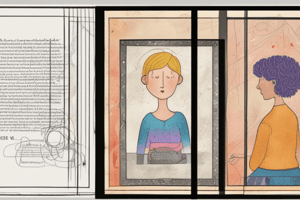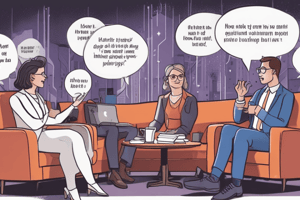Podcast
Questions and Answers
What might the therapist focus on during the Awareness Cultivation stage?
What might the therapist focus on during the Awareness Cultivation stage?
- Setting strict goals for the client
- Teaching the client new coping mechanisms
- Helping the client increase awareness of ineffective coping patterns (correct)
- Encouraging the client to ignore old patterns
Which stage may correspond to Prochaska's contemplation stage or preparation stage?
Which stage may correspond to Prochaska's contemplation stage or preparation stage?
- Stage 1: Problem Identification
- Stage 2: Awareness Cultivation (correct)
- Stage 4: Maintenance and Relapse Prevention
- Stage 3: Problem Resolution
In the Awareness Cultivation stage, what is one of the tasks the therapist might help the client with?
In the Awareness Cultivation stage, what is one of the tasks the therapist might help the client with?
- Push the client to visualize their future without input
- Recognize and draw on forgotten strengths (correct)
- Encourage the client to resist change
- Introduce new coping strategies abruptly
What skills does the therapist use in the Awareness Cultivation stage?
What skills does the therapist use in the Awareness Cultivation stage?
In which stage would a therapist likely focus on helping a client integrate disowned parts of their experiences?
In which stage would a therapist likely focus on helping a client integrate disowned parts of their experiences?
What is one task of counseling in the Problem Resolution stage?
What is one task of counseling in the Problem Resolution stage?
What does the therapist empower the client to do in the Problem Resolution stage?
What does the therapist empower the client to do in the Problem Resolution stage?
What is a key aspect of the skills used by the therapist in the Awareness Cultivation stage?
What is a key aspect of the skills used by the therapist in the Awareness Cultivation stage?
What task may correspond to Prochaska's action stage?
What task may correspond to Prochaska's action stage?
What are essential skills used by therapists in the Problem Resolution stage?
What are essential skills used by therapists in the Problem Resolution stage?
Study Notes
Counseling Skills and Interventions
- Therapists need to use a wider range of skills and interventions, including empathic responding skills, influencing skills, and advanced intervention techniques.
- Advanced intervention techniques include role playing, role reversal, mindfulness training, guided imagery, and experiential techniques.
Termination Stage
- The termination stage does not correspond to Prochaska’s stages, but might resemble the maintenance stage.
- Tasks in this stage include helping the client evaluate progress, transferring learning to real life, anticipating future challenges, and bringing closure to therapy.
- Counseling skills used in this stage include all skill levels.
Common Factors in Therapy
- Client factors account for 40% of therapeutic outcome, including client characteristics, functioning level, and motivation.
- The therapeutic relationship accounts for 30% of therapeutic outcome.
- Hope and expectancy account for 15% of therapeutic outcome.
- Specific techniques account for 15% of therapeutic outcome.
Client Characteristics
- Client factors include resiliency, ability to tolerate anxiety, and strength of the support system.
- Identifying a problem to work on in therapy contributes significantly to a positive outcome.
- Client motivation during therapy is more predictive of success than motivation at the beginning of therapy.
Stages of Change
- Contemplation stage: people intend to start healthy behavior in the foreseeable future (within 6 months), recognize problematic behavior, and weigh pros and cons of changing behavior.
- Preparation stage: people are ready to take action within 30 days, start taking small steps towards behavior change, and believe changing behavior can lead to a healthier life.
Counseling Strategies
- Counter-conditioning: substituting healthy behaviors and thoughts for unhealthy ones.
- Reinforcement management: rewarding positive behavior and reducing rewards of negative behavior.
- Stimulus control: re-engineering the environment to support healthy behavior and remove cues for unhealthy behavior.
Stages of Counseling/Psychotherapy
Stage 1: Problem Exploration
- Tasks include conducting a thorough intake, explaining the counseling process, establishing rapport, reassessing the central problem, and looking for client resources and strengths.
- Skills needed include attending, empathic responding, probing, and motivational interviewing.
Stage 2: Awareness Cultivation
- Tasks include helping the client increase awareness of ineffective coping patterns, working through resistance, and recognizing and drawing on forgotten strengths.
- Skills needed include empathic responding, influencing skills, and advanced intervention techniques.
Stage 3: Problem Resolution
- Tasks include reconstructing the client's schema, integrating disowned parts of experiences, and empowering the client to exercise freedom of choice.
- Skills needed include empathic responding, influencing skills, and advanced intervention techniques.
Studying That Suits You
Use AI to generate personalized quizzes and flashcards to suit your learning preferences.
Related Documents
Description
Learn about the different stages of change in motivational interviewing, including the Contemplation stage where individuals are considering starting a healthy behavior within the next 6 months. Explore how clients acknowledge issues and move towards positive changes.





